More than 400,000 gallons of crude fouled the Orange County Coast 30 years ago
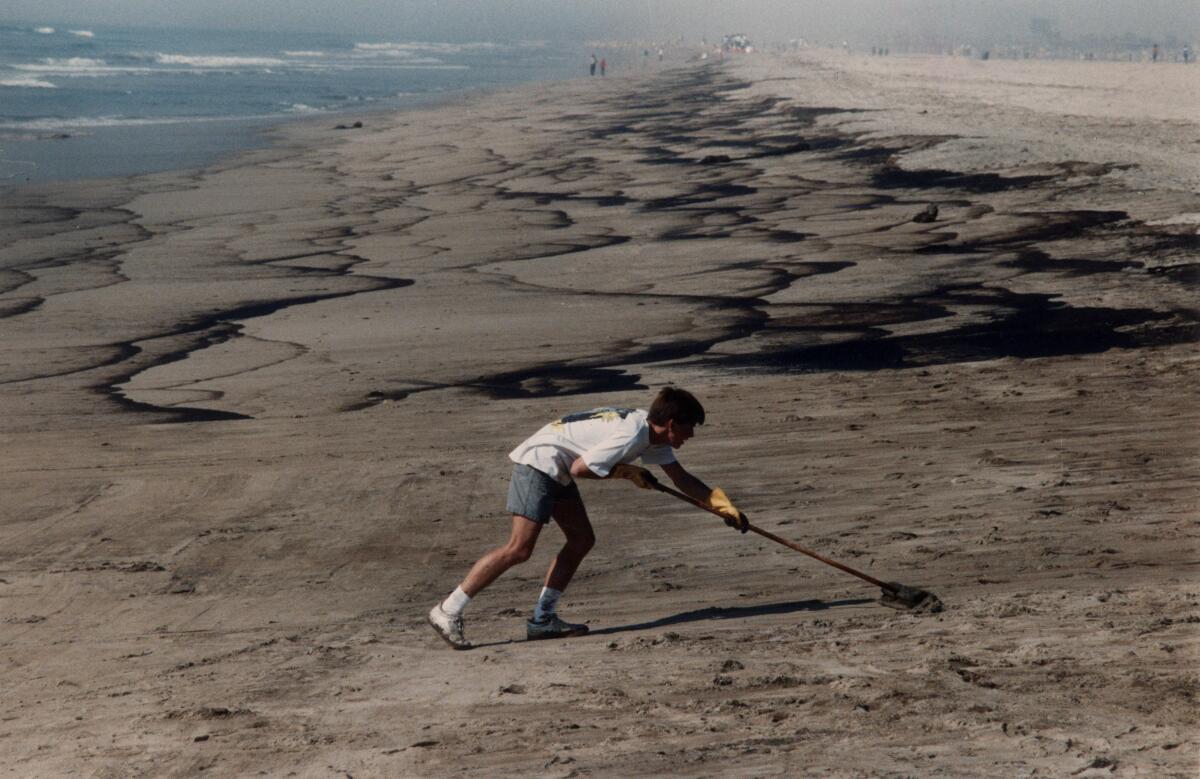
- Share via
On the afternoon of Feb. 7, 1990, the oil tanker American Trader ran over its anchor in relatively shallow water off Huntington Beach, spilling nearly 417,000 gallons of crude and fouling popular beaches along the Orange County coast. The oil killed fish and about 3,400 birds. The cleanup was completed on April 3.
The spill wasn’t nearly as big as the 11 million gallons spilled by the Exxon Valdez in Prince William Sound, Alaska, less than a year earlier, but it was the largest spill along the California coast since the 1969 Santa Barbara disaster that spilled more than 3 million gallons of oil into the Santa Barbara Channel and killed thousands of birds, fish and sea mammals.
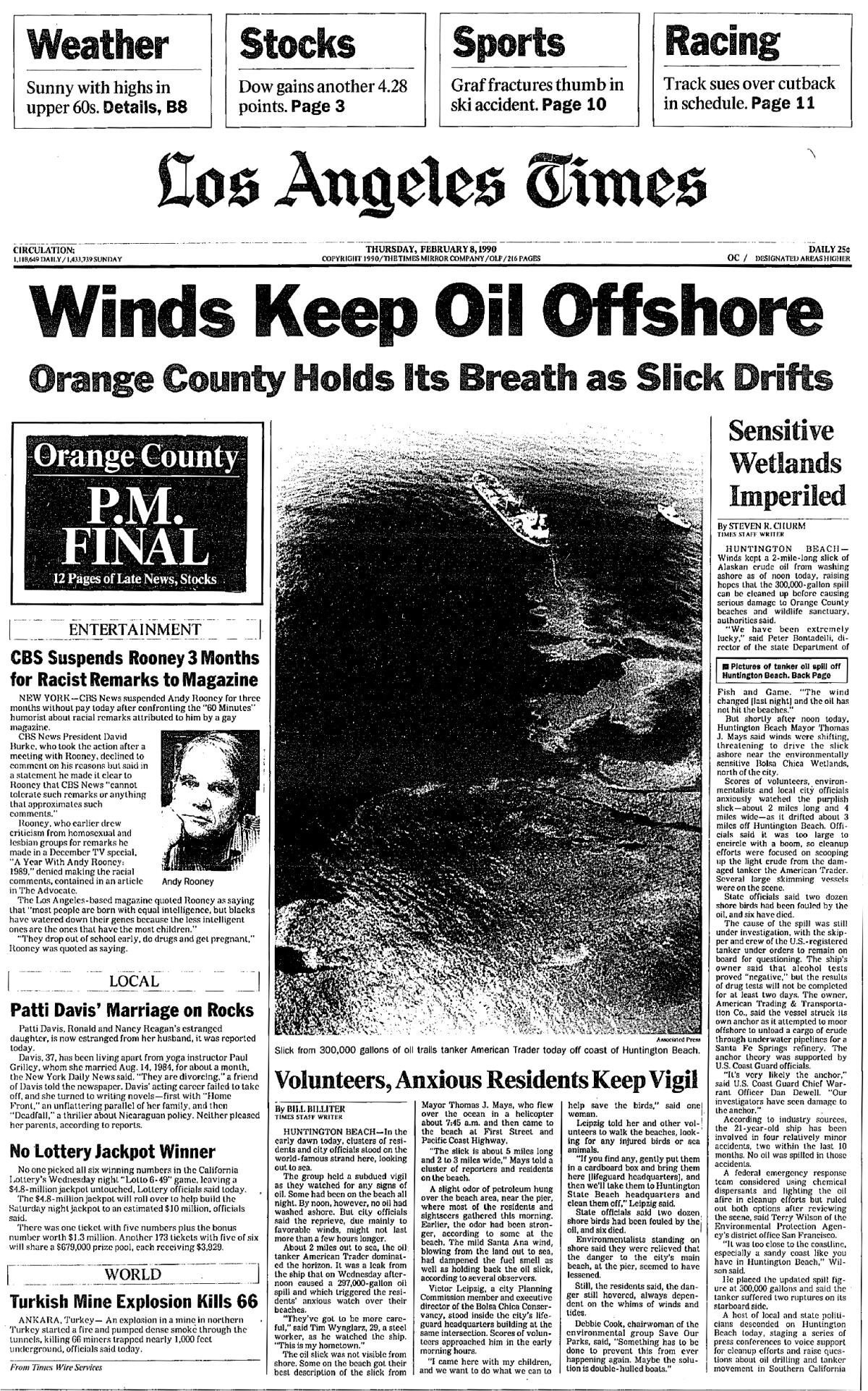
The American Trader, an 800-foot tanker leased by British Petroleum, struck its port anchor while riding in heavy swells about 7,200 feet off Huntington Beach. It was engaged in a complicated berthing maneuver which involved backing into a mooring where it would be secured to seven anchor buoys, then connected to an underwater pipeline to offload oil to a terminal near Newland Street operated by Golden West Refining Co.
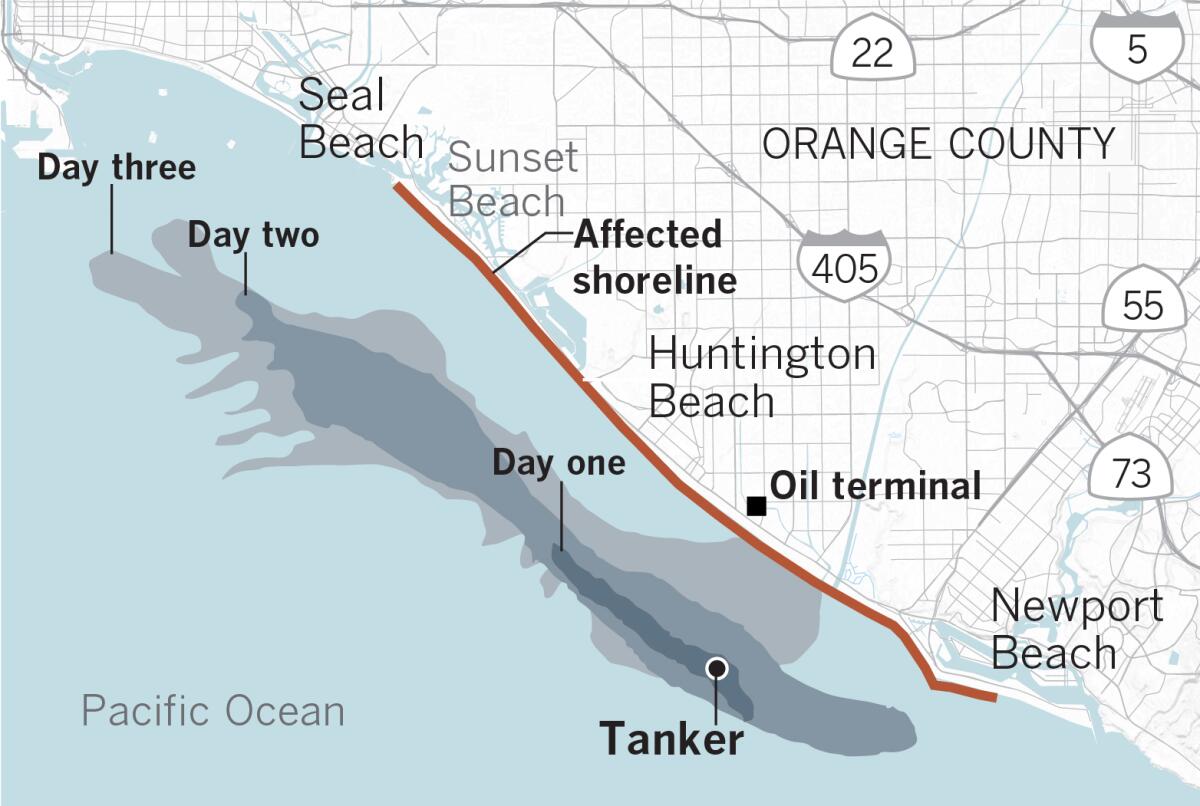
As the loaded tanker heaved up and down on the swells, it most likely came down on its own anchor, rupturing the hull and ultimately leaking 416,598 gallons of crude oil into the Pacific. The oil blackened 15 miles of Orange County beaches and threatened environmentally sensitive wetlands.
The incident happened in water about 50 feet deep. The Coast Guard estimated that the ship’s draft was 43 feet shortly before the accident, and that it would draw 43.7 feet fully loaded.
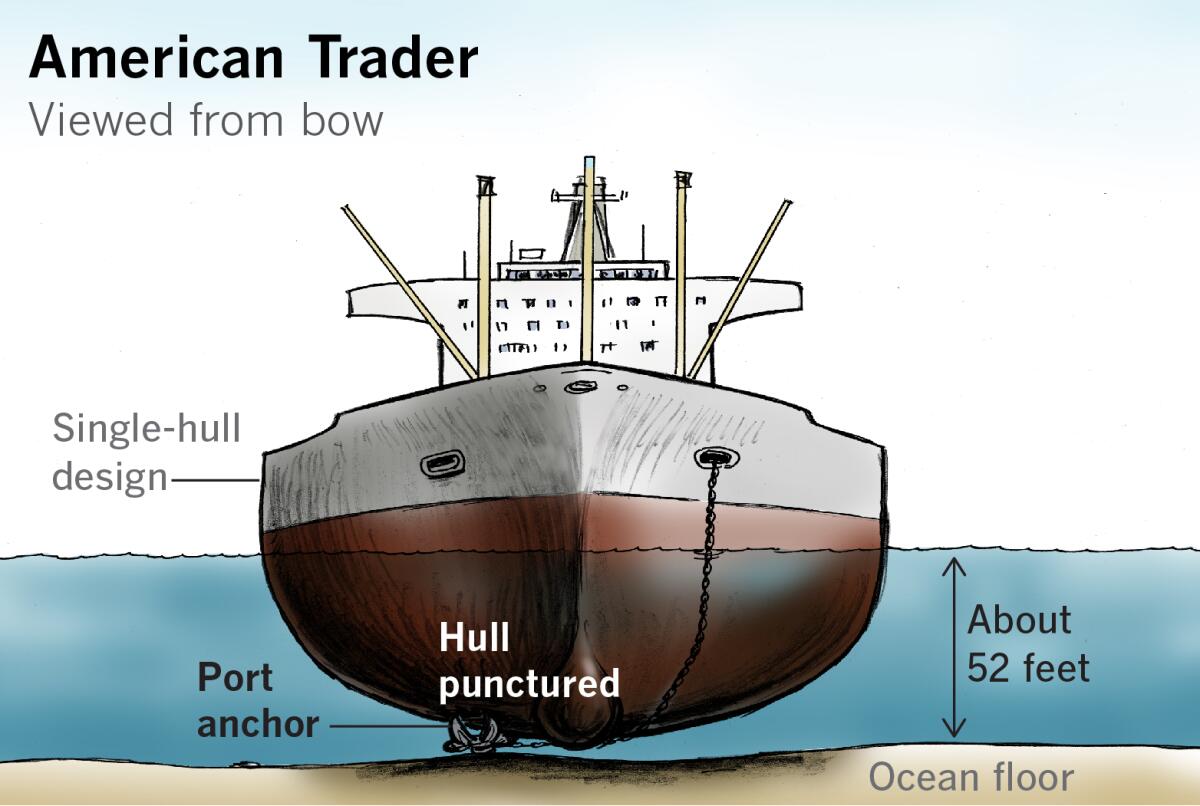
The American Trader’s voyage began in Valdez, Alaska, where it took on a cargo of crude bound for oil-storage barges at the Port of Long Beach. The tanker arrived on Jan. 29 and made stops in Long Beach’s harbor to unload oil. After that, it took on a new, 23-million-gallon load of oil from a supertanker moored off Long Beach.
It left Long Beach at 1 p.m. on Feb. 7 and headed south for the Golden West Offshore Mooring off Huntington Beach. There it was to offload 12.5 million gallons of oil to be piped to a refinery in Santa Fe Springs.
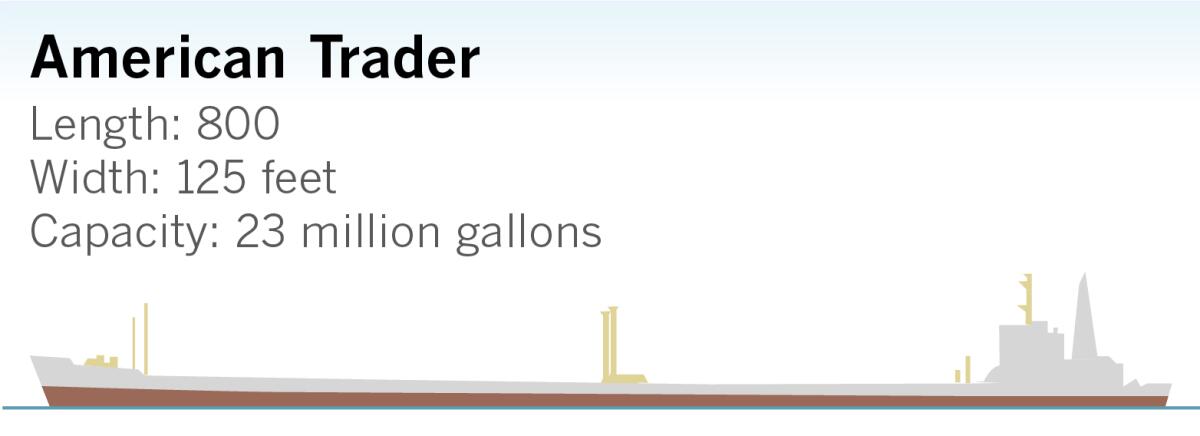
At about 4:30 p.m., during maneuvering to berth, the ship’s own anchor apparently tore a gash in its hull, puncturing the No. 1 and 2 cargo holds on the starboard side.
“We did everything right — the same way we always do,” The Times quoted 19-year-old deckhand Eric Bush, one of three crew members involved in dropping the ship’s anchors during the berthing process as saying after the accident occurred.
Bush recalled feeling “two sharp jolts” a few minutes apart while lowering the ship’s starboard anchor and thinking the ship might have struck an undersea mud bank. But then he looked over the side and saw thick, black oil spewing from the ship’s side.
“The water was just boiling with crude,” Bush told The Times.
The accident was blamed on currents and a failure to determine water depth.
The spill occurred off some of Southern California’s most popular beaches. Huntington city and state beaches were used by millions of people every summer. At the time of the spill, the Huntington Beach pier was shut down because of damage caused by a winter storm in 1988. Construction began on a new 1,856-foot pier in the fall of 1990.
After the spill, crews rushed to contain the oil slick and protect the beaches, but winds and currents eventually deposited oil on miles of beach. Rubberized booms were put in place to keep oil out of estuaries such as the Bolsa Chica Wetlands and Upper Newport Bay.
While the oil largely skirted coastal wetlands, locals found the spill depressing and frustrating, not only because of the catastrophic environmental damage, but because of the effect on local businesses.
“It’s awful,” said Robert August, a surf shop owner who gained fame in the surfing movie “Endless Summer.” “It’s pretty lousy for business,” he told The Times. “All that’s here now are reporters and politicians.”
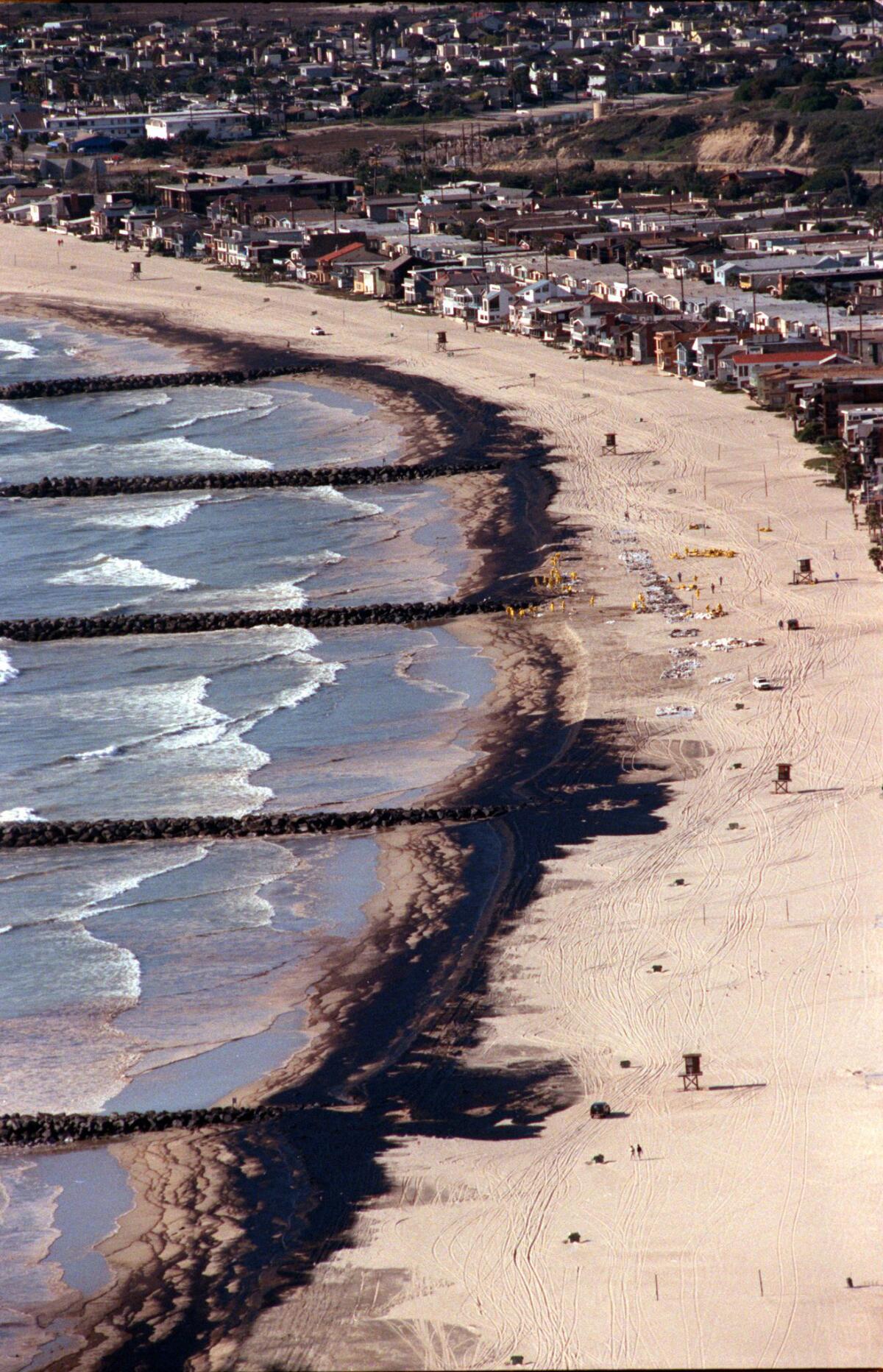
But the American Trader accident had a silver lining for environmentalists. It gave added impetus, in the wake of the Exxon Valdez spill on March 24, 1989, to controversial and expensive legislative proposals to require that all oil tankers operating in U.S. ports be double-hulled.
Arthur McKenzie, president of the Tanker Advisory Center in New York, told The Times, “This is it. This is the icing on the cake. Now we’re going to get double-bottoms.”
McKenzie, a former Exxon official and supporter of double-bottom requirements, said, “If the American Trader had had a double bottom or hull, this accident wouldn’t have spilled any oil; it wouldn’t have made a blip in the news.”
As a result, the landmark Oil Pollution Act of 1990 mandated the phasing out of all single-hull tankers and tank barges by Jan. 1, 2015.
In addition to the environmental component, recreational impacts of the spill on the coast were offset.
According to The Times, an Orange County jury on Dec. 8, 1997, found Attransco, the corporate owner of the American Trader, responsible for the spill. Local governments divvied up the legal settlement of $11.6 million, with about $8.4 million going to the cities of Huntington Beach and Newport Beach. Money was used for beach upgrades and for a new Back Bay Science Center in the Upper Newport bay.
That settlement followed others with BP America, the Trans-Alaska Pipeline Liability Fund and Golden West Refining Co.
More to Read
Sign up for Essential California
The most important California stories and recommendations in your inbox every morning.
You may occasionally receive promotional content from the Los Angeles Times.













